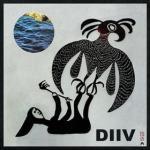
DIIV Oshin
(Captured Tracks)
There’s a story about how DIIV got their name because all four members have aquatic star signs – but in truth, they’re named “Dive” because their dream-pop constantly evocates liquid, ripples, sunlight twinkling on water. That, and they sound like Slowdive but faster (and less emotive). They turn their delay pedals up way too far and bask in the resultant eddies, but they’re too trendy to bother doing much more.
My favourite song on Oshin is the one with the motorik drumbeat and the two-chord bassline and the indecipherable vocals, with its focus on two blurred-out guitars breezily interplaying. The song has a really nice progression throughout, as both guitars begin to branch out and expand, languidly unfolding rather than making a show about it. The song has dutifully developed by the end but it’s difficult to tell under all the reverb. Sure, it’s not as clever or sonically inventive as Nothing Ever Happened by Deerhunter or as catchy as Live In Dreams by their Captured Tracks label-mates Wild Nothing, but it’s pretty, and it's supposed to evoke a laid-back laziness, and they achieve this to a tee.
Look, there are actually some really lovely moments in almost all of these tracks, but because DIIV do not foreground them in any way, they’re washed beneath the surface as soon as you begin to register. DIIV are so un-memorable they’re making a science of it; they’re all about this sense of distance. You never even begin to get a sense of who they are, and they like it that way. One wonders how, given the internet’s capacity for such a great proliferation in musical exposure, a band like DIIV have gained any ground without developing a shred of personality.
Perhaps it really is because they’re genuinely very competent at sustaining that pedal-happy buzz of shoegaze, and because they play it so cool, never going far wrong freeforming under their steady motorik. It’s an economic record made by a band who perform together tightly – but they aim for a sense of aesthetic completeness rather than any underlying emotional drive in these songs. It’s not like they need jammy link-tracks (Druun) and (Druun, Pt. II) as excuses to forego lyrics; every track could be a studio improv and you wouldn’t be able to tell. By the time the blatant standout Doused comes along, its punchy post-punk bassline sounds more revolutionary than it really is, just by being a few reverb dial notches lower than usual. But mostly the songs follow such a similar template that they’re practically indistinguishable.
And the result is that, well, it’s all very nice. I happen to have been permanently indoctrinated by a succession of GCSE English teachers’ exhortations against the word “nice”. It is the most unimperative way to express positivity and as such it suits DIIV rather nicely. Oshin is very nice. It’s great at being nice. And because it’s 2012 and because it’s tediously unassuming, people will listen to it in the background once or twice while skimreading blogs and forget about it within a year.
3 July, 2012 - 05:58 — Stephen Wragg